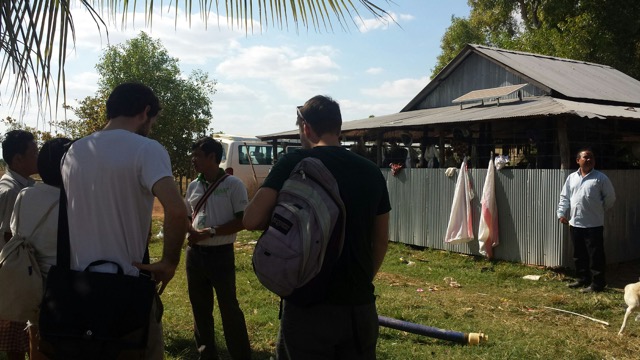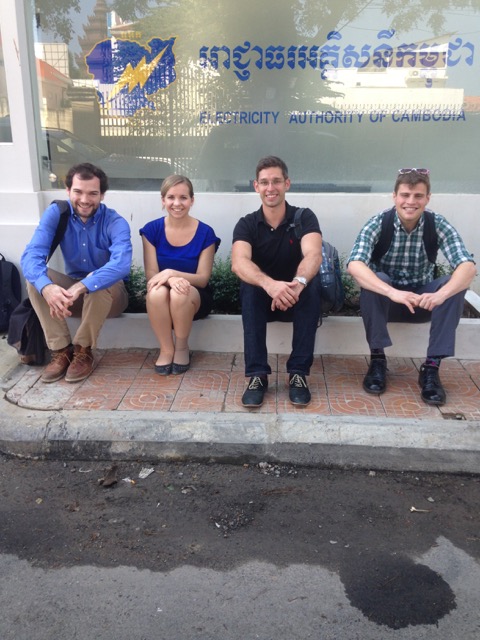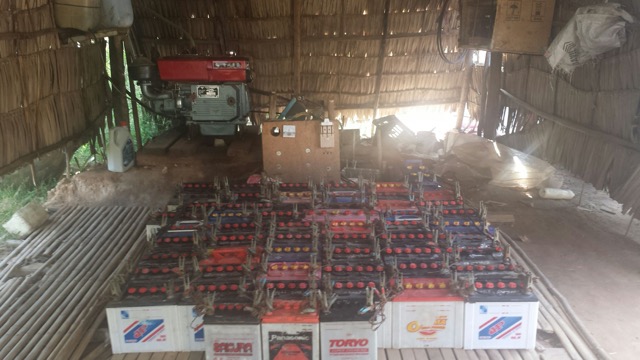The IDEV Practicum Blog is a six part series that chronicles the adventures of second-year IDEV students who take on client projects over winter break as a capstone to their graduate studies.
BY NOAH SCHLOSSER, GREGOR SCHUELER, PRZEMYSLAW GARBACZEWSKI & LAURA ANDERSON
Our team worked with a government-funded program aimed at promoting renewable energy development in Asia. We were asked to come up with a business case for investing in solar photovoltaic (PV) energy in Cambodia. The challenge was to find a commercially viable business model that would not rely on grants or subsidies. This turned out to be less straightforward than we anticipated, even though solar technology is very well suited for Cambodia.
Only 35 percent of Cambodians are connected to the electricity grid, and the vast majority of those without electricity are poor families living in rural areas. Those who are connected pay extremely high electricity prices. To put things into perspective, the price of electricity in the US is $0.06 to $0.12 per kWh. In Thailand the price per kWh is around $0.12. Despite a much lower income per capita in Cambodia, electricity prices range from $0.18 in Phnom Penh to above $0.50 in rural areas. Considering these expensive prices and the amount of sunlight in Cambodia, solar PV has the potential to be a very competitive energy option.
Prior to our January trip to Cambodia, we conducted three months of desk research on the Cambodian electricity market and various investment opportunities for solar PV. Based on our interim findings we thought that the likeliest candidates for an investment opportunity were solar home systems (SHS), mini-grids for rural areas, and industrial systems for factory owners.
Once we arrived in Phnom Penh and began our meetings, however, it quickly became clear that many of our ideas coming into the trip were not going to work. Over the course of two weeks, we had twenty-six meetings with solar entrepreneurs, impact investors, government officials, consulting firms, and development agencies. We learned from government officials that regulation makes it almost impossible to obtain a license allowing you to run a solar mini-grid. We also found that SHS entrepreneurs were having a difficult time growing and scaling their businesses. At $400 to $600, SHS are a large upfront investment for low-income customers. Further, distributors of cheap but low quality SHS had given solar a bad reputation in the country. Every solar entrepreneur we spoke to told us it was an uphill battle to convince people to buy a SHS.
One of our trips to research SHS was to a rural village that had not yet been connected to the electricity grid—or so we thought. When we arrived, we found that the village had, in fact, been connected to the grid a year before, and we spent the rest of the weekend enjoying the hospitality of our Cambodian hosts. We went to a wedding, sampled cow brain and fire ants, and chatted with the local monks.
By the end of our trip, our conclusion was that industrial solar solutions for factory owners present the most viable option for a commercial business model. Cambodia has a large manufacturing industry with over 600 garment factories and nineteen special economic zones. Providing solar to industrial clients does not require a license, and such clients also have the capital to finance the investment. Supplementing factories’ energy use with solar can be a huge cost-saver for the factories, as well as create positive environmental impact by reducing carbon emissions from diesel electricity generation. Going forward with our project, we are building a financial model and investment case targeting industrial clients in Cambodia.
ABOUT THE AUTHORS
Noah Schlosser received his Bachelor of Arts in international political economy from the University of Wisconsin where he graduated with distinction. After graduation, he worked as a sales associate at Meltwater News, a cloud-based software company, before moving to China, where he worked for three years in the education industry. More recently, Noah has interned at the Inter-American Dialogue where he focused on remittance flows in Latin America, and currently works at Mott Macdonald Consulting, working on multiple US-government-funded energy projects in Sub-Saharan Africa. Noah also works as a research assistant at the SAIS China-Africa Research Initiative. At SAIS, Noah is focusing on project management and micro-level development work, particularly in the energy, water, and infrastructure sectors.
Originally from Germany, Gregor Schueler graduated from the University of St. Andrews in Scotland in 2012 with a degree in economics and international relations. He then joined the German Agency for International Cooperation, GIZ, working on “inclusive business” in Germany and Egypt. At SAIS, Gregor is pursuing a concentration in international development and focusing on the intersection of private finance and development and their impact on the Bottom of the Pyramid in least developed countries. As part of his graduate studies, Gregor worked with a South African capital advisory company assisting social entrepreneurs raise commercial growth capital. Further work experience includes the Grameen Creative Lab, a consulting company for social businesses co-founded by Muhammad Yunus.
Przemyslaw Garbaczewski, originally from Poland, holds a Bachelor of Arts in economics and a Bachelor of Science in business administration in finance and international business from the University at Buffalo, the State University of New York. He worked as a fixed income trader at Morgan Stanley in New York for three years, then left the firm to work in Thailand as a business & finance manager at an NGO focusing on renewable energy. This past summer, Przemyslaw worked at FINCA International focusing on merger and acquisition opportunities in the microfinance banking space. At SAIS, Przemyslaw is focusing on private sector growth, development, and financing. Przemyslaw has studied and worked in the US, Asia and Europe and brings a rich international academic and professional background.
Laura Andersen received a Bachelor of Arts from the University of Delaware in 2008, where she was in the honors program and studied international relations and Spanish. After graduation, she worked for three years as a senior recruiter at Bain Capital, a private equity firm in Boston. Afterwards, she worked in Nepal at a local development organization called Partnership for Sustainable Development. She also has experience in Uganda working for the Clinton Health Access Initiative, where she supported the Ministry of Health in creating a monitoring and evaluation plan for vaccines funding, as well as conducted field research to support a policy initiative for HIV-positive mothers. This summer, Laura interned at Enclude, a development consulting firm which provides technical advisory services to financial institutions in developing countries. She is interested in impact investment and market-based solutions to development.




